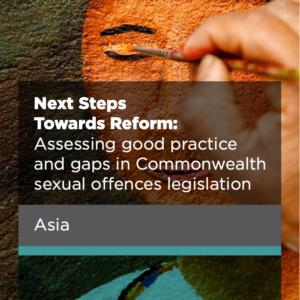India’s sexual offences laws are in the Indian Penal Code 1935 (IPC), as amended by the Criminal Law (Amendment) Act 2013, as well as the Protection of Children from Sexual Offences Act 2012 (POCSO). The Indian Evidence Act 1872 contains the evidentiary rules for all criminal offences, including sexual offences.
In 2012-2013, India made significant changes to its sexual assault offences laws in response to a report by a three- member Committee headed by Justice J.S. Verma, former Chief Justice of the Supreme Court (‘Verma Report’). The ‘Verma Commission’ recommended amendments to the criminal law to provide for quicker trials and enhanced punishments for sexual assault against women in response to public pressure after a gang rape. The Indian government implemented some of the Verma Commission’s recommendations, including for example, expanding the definition of rape in the IPC to include all forms of non-consensual sexual penetration, defining ‘consent’ to mean ‘unequivocal voluntary agreement when the woman by words, gestures, or any verbal or non-verbal communication communicates willingness to participate in the specific sexual act’, and expressly legislating that evidence of resistance is not required to show there was no consent. Additionally, a targeted child sexual assault law was enacted, with some features that meet good practice standards. For example, a range of new offences were included, although they do not cover sexual grooming, sexual communication with a child, or sexual activity in front of a child.
Whilst much of the IPC and the POCSO meet the good practice standards for sexual assault, some aspects do not. For example, the legislation does not criminalise rape and sexual assault in marriage unless the spouse who is the victim/ survivor is under 18, or if the spouses are ‘living separately’. Non-consensual sexual intercourse should be expressly criminalised in the legislation in every circumstance without exception. Allowing a defence of rape in marriage is discriminatory on the grounds of sex and marital status, which is contrary to good practice and human rights standards. Also, the legislation does not provide for close-in-age defences to protect young people from being prosecuted for genuinely consensual sexual activity with their peers when one or both are under the age of consent.
In 2018, the Supreme Court of India ruled that s 377 of the IPC, which had criminalised consensual same-sex sexual activity, was unconstitutional (Navtej Singh Johar v. Union of India). Section 377 should be repealed to reflect this decision.
India is a state party to relevant international human rights treaties, including the Convention on the Elimination of All Forms of Discrimination against Women, Convention on the Rights of the Child, Convention on the Rights of Persons with Disabilities, International Covenant on Civil and Political Rights and Convention against Torture and Other Cruel, Inhuman or Degrading Treatment or Punishment.
Read more about the ruling in Navtej Singh Johar v. Union of India.
The full assessment of India is available here.



